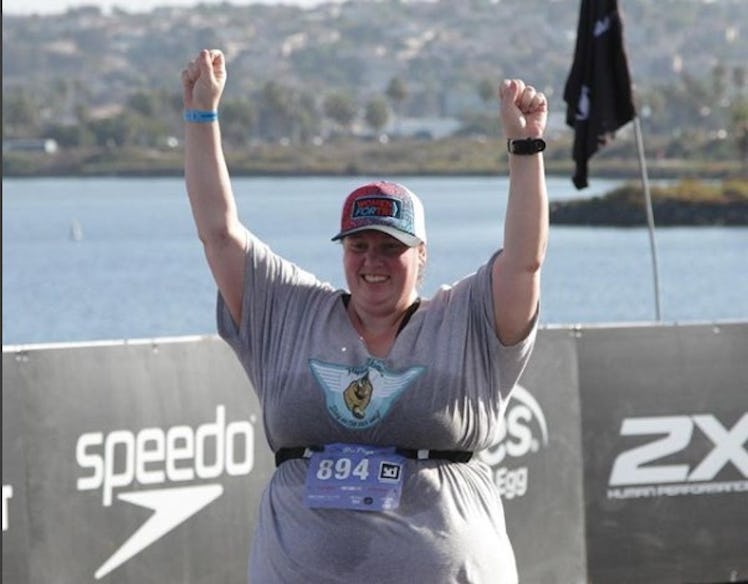
Why Regan Chastain Wants To Separate Fitness From Weight Loss
Early in 2018, Ragen Chastain became the heaviest woman to run a marathon, setting a Guinness World Record along the way. At 288 pounds, there were plenty of people who heckled the writer, speaker, and size acceptance advocate the moment she decided to train and participate in such events. "I once had grown men throw eggs at me from their car!" she tells Elite Daily. For Chastain, however, creating representation of plus-size folks involved in fitness — particularly those with no desire to lose weight — was enough motivation to not only compete in, but to complete, two marathons.
When it comes to plus-size people and fitness, Chastain knows that there's a huge amount of cultural hypocrisy at play. "Lots of folks want to say 'plus-size people need to exercise,' but what they don’t tell you is that all too often the end of that sentence is 'so that I can moo at them from my car,'" she explains. "Then there is the issue of access: finding clothing that fits and is activity appropriate can be nearly impossible, and it seems that plenty of people think we should exercise in our homes, with the blinds drawn, wearing clothing fashioned from our bed sheets."
"It’s absolutely critical to get clear that nobody of any size is obligated to exercise, but that everyone of every size should be welcome," she adds. "For that reason, I purposefully work out in public as a way to create visibility for other plus-size people who may want to do the same, so that they know that we have every right to take up space in the fitness world, and that we are under no obligation to bow to the whims of size bigots."
Despite having now run two marathons, including the Mainly Marathon in Sanford, Maine where she officially set the Guinness World Record, Chastain has encountered "trolls who insist that my marathons shouldn’t count because I completed them slowly." For every criticism, however, there is praise. Chastain regularly receives "emails from people who encouraged me along the way, and who told me that they have always wanted to try running (whether it’s a 5k or a marathon or something in between) and because they saw me out there, they decided to do it themselves."
Such emails are perhaps evidence of how many people of size have felt rejected or otherwise unwelcome from spaces designed for physical activity. They are evidence of how much healing is left to be done. "A lot of plus-size people have had messy breakups with exercise because of the focus on weight loss, and because of the fatphobia that runs through the fitness world," Chastain says. "In order to overcome these issues, I think we first need to acknowledge that it’s not in our heads — fatphobia in the problem here, not fat people."
"I think that it’s important that we get to come to movement on our own terms," she adds. "For some of us that means taking our fat bodies into fitness spaces and refusing to apologize or back down. For others it may mean engaging in fitness activities at home, or in safe spaces dedicated to larger bodies. Whatever we choose is valid."
Healing may also begin with a complete psychological and emotional separation of fitness and weight loss. Despite cultural messaging that suggests the only reason fat people should exercise is to shrink their bodies, there are plenty of reasons to work out, if one so desires, that have nothing to do with manipulating body size.
"The evidence is clear that even if people are able to lose weight in the short term, most of them gain it back," Chastain notes. "But exercise conveys lots of benefits to people of all sizes, so when we try to link exercise with weight loss — especially if we suggest that weight loss is the only 'good' outcome of exercise — we do people a tremendous disservice. I hear from people all the time who gave up on exercise because it didn’t make them thin and who were miserable exercising because the only reason they ever moved their body was out of hatred of it. When they come back to movement from a size-positive perspective they get to have a magical experience in which they get to love and appreciate their body, while they enjoy moving it."
"We are much better off choosing goals that we can actually control, like how much movement we want to do, what kind of movement, etc. and then let our bodies settle at whatever weight they are comfortable, while becoming clear that our bodies are amazing and worthy at all sizes."
Although Chastain reiterates that no one is obligated to participate in fitness to prove their health status, or to move their bodies in any particular way, she does believe that there is a radical nature to occupying space in the fitness world as a fat person.
"Hearing about how someone was inspired by what I was doing to walk to their mailbox and back for the first time since a car accident, or how they not only signed up for their first triathlon, but also emailed the race director to point out that the race didn’t offer a t-shirt in their size, or decided to say 'screw the haters' and throw on a bathing suit and go swimming because they love and miss swimming, always brings tears to my eyes," she says. "Not only because of their achievements, but because I know that they are inspiring other plus-size people to take up the space they deserve in the fitness world." Until fatphobia is a thing of the past, taking up space without shame or apology in a large body will always be an act of rebellion.